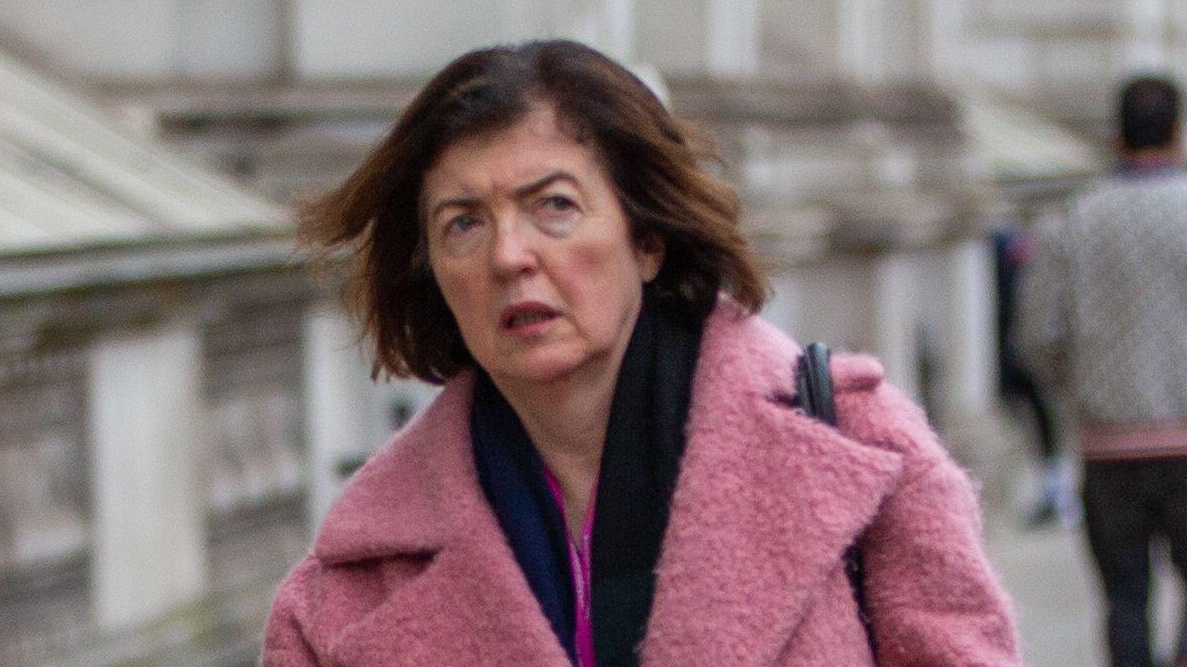Who is Sue Gray? The Whitehall ‘sleazebuster’ with Boris Johnson’s future in her hands
Gray’s report on Downing Street lockdown parties is due out today

A free daily email with the biggest news stories of the day – and the best features from TheWeek.com
You are now subscribed
Your newsletter sign-up was successful
Sue Gray, once a senior but obscure government mandarin and now practically a household name, is set to release her report on rule-breaking Downing Street parties later today.
Having been tasked with investigating claims that No. 10 staff, including Boris Johnson, repeatedly broke Covid-19 restrictions, Gray – dubbed “Whitehall’s sleazebuster in chief” – now holds the fate of the prime minister “in her hands”, The Times said.
Publication of her long-awaited report into the debacle was held off until the conclusion of the Metropolitan Police’s Operation Hillman. The investigation has concluded, with 83 people – including Johnson, his wife Carrie, and Chancellor Rishi Sunak – given 126 fines for Covid breaches. Gray is now clear to release her report, which is thought to be highly critical of Johnson and his senior aides.
The Week
Escape your echo chamber. Get the facts behind the news, plus analysis from multiple perspectives.

Sign up for The Week's Free Newsletters
From our morning news briefing to a weekly Good News Newsletter, get the best of The Week delivered directly to your inbox.
From our morning news briefing to a weekly Good News Newsletter, get the best of The Week delivered directly to your inbox.
The PM received only one fixed penalty notice from the Met Police. But new pictures obtained by ITV News, which show the prime minister raising a glass to Lee Cain, his outgoing director of communications, at a leaving party in November 2020, are likely to raise questions from unhappy backbench MPs in the week Gray’s report is slated for release.
A BBC Panorama documentary last night also painted a picture of packed parties and a culture set by Johnson for staff to be able to ��let their hair down”. One anonymous insider told the programme: “He wasn’t saying, ‘Can everyone break up and go home? Can everyone socially distance? Can everyone put masks on?’ No, he wasn’t telling anybody that. He was grabbing a glass for himself.”
‘Woman who runs Britain’
A permanent secretary in the Department for Levelling Up, Housing and Communities, her “formidable reputation” in Westminster was forged during her years as director-general of propriety and ethics in the Cabinet Office, a role she held from 2012 to 2018, according to the Financial Times (FT).
“Westminster is littered with major scalps” she took while in the role, including former deputy prime minister Damian Green, who quit after an inquiry led by Gray found he made “inaccurate and misleading” statements over what he knew about claims pornography was found on his office computer in 2008.
A free daily email with the biggest news stories of the day – and the best features from TheWeek.com
She also “had a hand” in the resignations of ex-chief whip Andrew Mitchell and former defence secretary Liam Fox, the paper added.
At the time, she was described by the then BBC Newsnight policy editor Chris Cook as the “most powerful civil servant you’ve never heard of”.
However, Cook also reported that Gray had previously advised special advisers to destroy emails by “double deletion” in an attempt to “thwart” Freedom of Information requests, which are frequently used by journalists when investigating public bodies.
A former adviser told Politico she was nicknamed “Sue Gray area” by those working on Whitehall because “everything she does is so murky”. “There’s never any paper trail. There’s never any record,” they added. “Her job is to make bad things go away for the prime minister however she can.”
Former cabinet minister Oliver Letwin once speculated that her influence made her perhaps as powerful as the prime minister, according to extracts of his diaries cited by the FT.
“It took me precisely two years before I realised who it is that runs Britain. Our great United Kingdom is actually entirely run by a lady called Sue Gray, the head of ethics or something in the Cabinet Office. Unless she agrees, things just don’t happen.”
Unusual rise
Gray began her career as a civil servant in the 1970s, with roles in transport, health, and work and pensions.
She married Northern Irish country and western singer Bill Conlon, leaving the civil service to run a pub in County Down, an area close to the border with Ireland so dangerous it was nicknamed “Bandit Country”, according to The Times. “I loved it, loved it at the time, I’d never do it again,” she later told the BBC.
She was “lured back to London” to work in the Cabinet Office under Gordon Brown and Tony Blair, reported The Guardian. According to one former adviser to Blair, she was a “fixer”, someone “who worked in the shadows to vet potential peerages and smooth over problems”.
Under David Cameron, she was given another high-profile role after making “an impression on the new government on its first day in office in 2010”, according to former chancellor George Osborne.
“Thirty minutes after the Labour team had left, everyone was fawning at David Cameron,” the former chancellor tweeted in December. “Then someone spoke out: ‘I’m sorry PM but you can’t do that.’ ‘Who’s that?’ I asked. Sue Gray.”
In 2018 she unexpectedly left Whitehall for a new role as permanent secretary of Northern Ireland’s finance department. In 2020 she then applied to become head of Northern Ireland’s civil service, but told the BBC she failed to land the role because she was “too much of a challenger”.
What’s the latest?
Gray released a limited interim report in January that criticised “failures of leadership and judgement” by No. 10 and the Cabinet Office, but she was limited on what she could say by the ongoing police investigation.
With her full report set to be published imminently, in recent days allies of the prime minister have accused Gray of “playing politics and enjoying the limelight a little too much”. There has also been finger-pointing over who scheduled a meeting between Johnson and Gray to discuss procedures surrounding the publication of the report, said the Daily Mail.
No. 10 admitted that the meeting had been organised by a senior aide, reportedly after Johnson was “apoplectic” over a report in The Times suggesting that Gray would directly criticise him for the culture in No. 10 and his attendance at events. The paper said that her findings may be “so damning that it could leave Boris Johnson with no choice but to resign”.
Gray has reportedly contacted 30 individuals, including Johnson, who are either named or indirectly referred to in her report, in order to give them a right of reply before the report is published.
A report in The Sunday Times also suggested that Gray was “surprised” that Johnson was fined only once, for attending a party thrown for his 56th birthday. One source told the paper that Gray thought the birthday party was “the least egregious event she has looked into.”
Her apparent misgivings over the police findings suggest that “far from being over, Johnson’s partygate hangover has several more days to run”, said the paper.
Officials with knowledge of the lockdown parties inquiry told the FT that Gray is “acutely aware” of the political consequences of the findings of her inquiry – findings which could end Johnson’s career. “She has to tread very carefully, even by her standards,” one said.
Sorcha Bradley is a writer at The Week and a regular on “The Week Unwrapped” podcast. She worked at The Week magazine for a year and a half before taking up her current role with the digital team, where she mostly covers UK current affairs and politics. Before joining The Week, Sorcha worked at slow-news start-up Tortoise Media. She has also written for Sky News, The Sunday Times, the London Evening Standard and Grazia magazine, among other publications. She has a master’s in newspaper journalism from City, University of London, where she specialised in political journalism.
-
 6 of the world’s most accessible destinations
6 of the world’s most accessible destinationsThe Week Recommends Experience all of Berlin, Singapore and Sydney
-
 How the FCC’s ‘equal time’ rule works
How the FCC’s ‘equal time’ rule worksIn the Spotlight The law is at the heart of the Colbert-CBS conflict
-
 What is the endgame in the DHS shutdown?
What is the endgame in the DHS shutdown?Today’s Big Question Democrats want to rein in ICE’s immigration crackdown
-
 How corrupt is the UK?
How corrupt is the UK?The Explainer Decline in standards ‘risks becoming a defining feature of our political culture’ as Britain falls to lowest ever score on global index
-
 The high street: Britain’s next political battleground?
The high street: Britain’s next political battleground?In the Spotlight Mass closure of shops and influx of organised crime are fuelling voter anger, and offer an opening for Reform UK
-
 Is a Reform-Tory pact becoming more likely?
Is a Reform-Tory pact becoming more likely?Today’s Big Question Nigel Farage’s party is ahead in the polls but still falls well short of a Commons majority, while Conservatives are still losing MPs to Reform
-
 Asylum hotels: everything you need to know
Asylum hotels: everything you need to knowThe Explainer Using hotels to house asylum seekers has proved extremely unpopular. Why, and what can the government do about it?
-
 Taking the low road: why the SNP is still standing strong
Taking the low road: why the SNP is still standing strongTalking Point Party is on track for a fifth consecutive victory in May’s Holyrood election, despite controversies and plummeting support
-
 Behind the ‘Boriswave’: Farage plans to scrap indefinite leave to remain
Behind the ‘Boriswave’: Farage plans to scrap indefinite leave to remainThe Explainer The problem of the post-Brexit immigration surge – and Reform’s radical solution
-
 ‘Peak consumption has become the Holy Grail of the energy debate’
‘Peak consumption has become the Holy Grail of the energy debate’Instant Opinion Opinion, comment and editorials of the day
-
 What difference will the 'historic' UK-Germany treaty make?
What difference will the 'historic' UK-Germany treaty make?Today's Big Question Europe's two biggest economies sign first treaty since WWII, underscoring 'triangle alliance' with France amid growing Russian threat and US distance